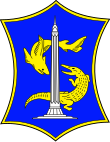
Sukarno was an Indonesian statesman, orator, revolutionary, and nationalist who was the first president of Indonesia, serving from 1945 to 1967.

The Communist Party of Indonesia was a communist party in the Dutch East Indies and later Indonesia. It was the largest non-ruling communist party in the world before its violent disbandment in 1965. The party had two million members in the 1955 elections, with 16 percent of the national vote and almost 30 percent of the vote in East Java. During most of the period immediately following the Indonesian Independence until the eradication of the PKI in 1965, it was a legal party operating openly in the country.
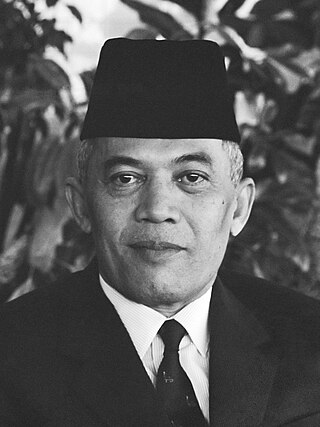
Abdul Haris Nasution was a high-ranking Indonesian general and politician. He served in the military during the Indonesian National Revolution and he remained in the military during the subsequent turmoil of the Parliamentary democracy and Guided Democracy. Following the fall of President Sukarno from power, he became the Speaker of the People's Consultative Assembly under President Suharto. Born into a Batak Muslim family, in the village of Hutapungkut, Dutch East Indies, he studied teaching and enrolled at a military academy in Bandung.
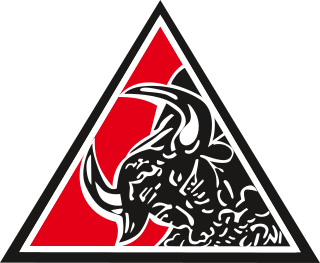
The Indonesian National Party was the name used by several nationalist political parties in Indonesia from 1927 until 1973. The first PNI was established by future President Sukarno. After independence, the new PNI supplied a number of prime ministers, and participated in the majority of cabinets in the 1950s and 1960s. The party was fused into the Indonesian Democratic Party in 1973. In the years following the reforms of the late 1990s, a number of parties claiming to be the continuation of previous PNIs stood in elections, but gained only a handful of seats.
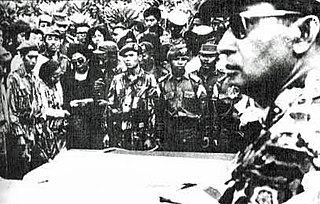
Indonesia's transition to the New Order in the mid-1960s ousted the country's first president, Sukarno, after 22 years in the position. One of the most tumultuous periods in the country's modern history, it was the commencement of Suharto's 31-year presidency.
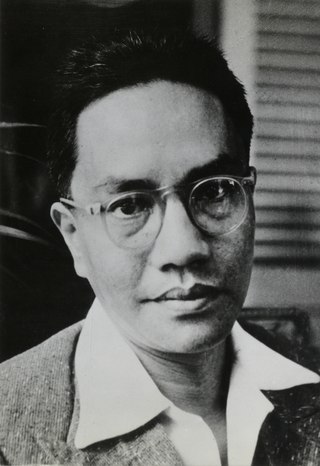
Amir Sjarifuddin Harahap was an Indonesian politician and journalist who served as the second prime minister of Indonesia from 1947 until 1948. A major leader of the left wing during the Indonesian National Revolution, he previously served as Minister of Information from 1945 until 1946 and Minister of Defense from 1945 until 1948. Amir was born into the Sumatran aristocracy and was educated at Leiden University. At Leiden, he became a member of the board of the Gymnasium student association in Haarlem and was involved in the Batak student organization Jong Batak. He returned to Indonesia due to family troubles but continued his education at the Rechts Hogeschool in Batavia.

Munawar Musso was a leader of the Communist Party of Indonesia and one of the key figures in the 1948 Madiun affair.

Sarekat Islam or Syarikat Islam was an Indonesian socio-political organization founded at the beginning of the 20th century during the Dutch colonial era. Initially, SI served as a cooperative of Muslim Javanese batik traders to compete with the Chinese-Indonesian big traders. From there, SI rapidly evolved into a nationalist political organization that demanded self-governance against the Dutch colonial regime and gained wide popular support. SI was especially active during the 1910s and the early 1920s. By 1916, it claimed 80 branches with a total membership of around 350,000.

Guided Democracy was the political system in place in Indonesia from 1959 until the New Order began in 1966. It was the brainchild of President Sukarno, and was an attempt to bring about political stability. Sukarno believed that the parliamentarian system implemented during the liberal democracy period in Indonesia was ineffective due to its divisive political situation at that time. Instead, he sought a system based on the traditional village system of discussion and consensus, which occurred under the guidance of village elders. With the declaration of martial law and the introduction of this system, Indonesia returned to the presidential system and Sukarno became the head of government again.

The Jakarta Special Region is administratively equal to a province with special status as the largest city of Indonesia. Instead of a mayor, the executive head of Jakarta is a governor. The governor of Jakarta is an elected politician who, along with the vice governor and 106 members of the Regional People's Representative Council (DPRD), is accountable for the strategic government of the city of Jakarta.
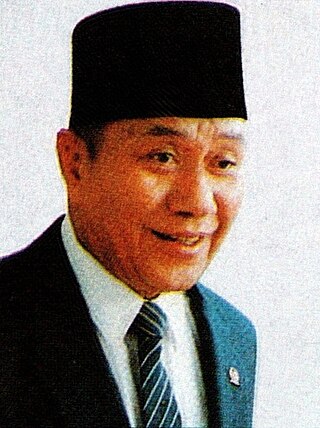
General (Ret.) Amir Machmud was an Indonesian military general who was an eyewitness to the signing of the Supersemar document transferring power from President Sukarno to General Suharto.

Major General (Ret) Basuki Rahmat was an Indonesian general, National Hero and a witness to the signing of the Supersemar document transferring power from President Sukarno to General Suharto.

This is the timeline of Indonesian National Revolution.

Lukman Njoto or Njoto was a senior national leader of the Communist Party of Indonesia (PKI), who joined the party shortly after the country's declaration of independence, and was killed following the 1965 coup attempt.

The Madiun Affair, known locally as the Communist Party of Indonesia rebellion of 1948, was an armed conflict between the government of the self-proclaimed Republic of Indonesia and the left-wing opposition group Front Demokrasi Rakyat during the Indonesian National Revolution. The conflict began on September 18, 1948, in Madiun, East Java, and ended three months later when most FDR leaders and members were detained and executed by TNI forces.
Local elections were held in parts of Indonesia in the second half of 1957 to elect provincial and regency and city councils. The Communist Party of Indonesia won a larger share of the vote than it had in the 1955 legislative election, the only major party to do so. The PKI's success, and the declining or stagnant support for other parties, caused concern that the PKI might dominate the planned 1959 national legislative elections, one reason these did not take place.

Tan Ling Djie was Indonesian communist politician active during the late 1940s and 1950s.
Radjamin Nasution was an Indonesian politician and civil servant. He briefly served as the first Indonesian mayor of Surabaya in August 1945, during the early months of the Indonesian National Revolution, although he was not officially discharged until 1950. He worked as a customs official during the Dutch East Indies era.
Satrio Sastrodiredjo was an Indonesian physician and politician of the Indonesian Communist Party. He served as the Vice Governor of East Java between 1963 and 1965, and previously as the mayor of Surabaya between 1958 and 1963. His political career was cut short after the 30 September movement and he was imprisoned.

The Surabaya City Regional House of Representatives is the unicameral municipal legislature of the city of Surabaya, East Java, Indonesia. It has 50 members, who are elected every five years, simultaneously with the national legislative election.
